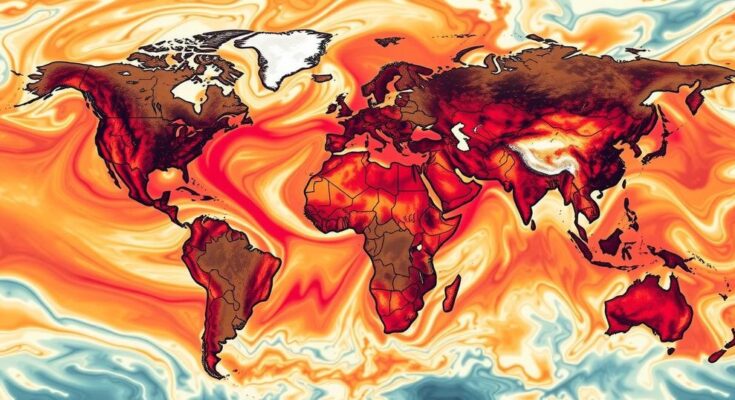The year 2024 witnessed a 41-day increase in dangerous heat globally due to human-caused climate change, with extreme weather events leading to over 3,700 deaths and significant displacement. Scientists indicated a clear link between climate change and these severe weather patterns, emphasizing the need for urgent action and adaptation strategies to mitigate the ongoing crisis.
In 2024, the phenomenon of climate change resulted in an alarming average increase of 41 days of dangerous heat experienced globally. This assessment was provided by a coalition of climate researchers who highlighted the intensification of extreme weather events as a direct consequence of human contributions to climate change. Countries worldwide, from Northern California to West Africa, have suffered deleterious effects due to unprecedented heat, droughts, and other weather-related challenges that endanger lives and livelihoods.
The year 2024 was marked by extreme weather patterns, with scientists from the World Weather Attribution and Climate Central analyzing temperature data to establish connections between these conditions and climate change. This analysis revealed that 2024 is likely the hottest year ever recorded, prompting urgent discussions about the implications of anthropogenic climate change on global weather systems. Notably, the research found that severe weather patterns, such as heat waves and cyclones, became more likely and intense, exacerbating societal challenges.
Significant findings indicated that 26 out of 29 extreme weather events analyzed this year were directly linked to climate change, resulting in over 3,700 fatalities and the displacement of millions. The region facing the brunt of the heat included places as diverse as Greece, which was forced to close its Acropolis, and Southeast Asia, where schools had to shut down due to health risks associated with excessive heat. Climate researchers expressed that the poorest nations of the world are disproportionately affected, with many regions experiencing extreme heat exceeding 150 days annually due to climate-induced factors.
Despite the dire implications of this year’s climate events, experts acknowledge that while climate change has significantly contributed to the frequency and intensity of these disasters, strategic adaptation measures can mitigate impacts. Collaborative efforts at the international level, promoting climate awareness and change adaptation strategies, are essential to alleviate the adverse consequences caused by our warming planet.
This analysis of climate change implications underscores a critical juncture in global efforts to address environmental challenges. Experts warn that without substantive measures to reduce greenhouse gas emissions, the world will continue to experience escalating climate extremes.
In closing, the 2024 report on climate and extreme weather serves as a clarion call for immediate action to combat climate change. It emphasizes the urgency of global cooperation in implementing adaptive measures to protect lives and safeguard livelihoods from the ravaging effects of climate phenomena. The message is clear: significant efforts must be made to reduce our dependence on fossil fuels and enhance our resilience to ensure a sustainable future.
The article discusses the alarming impacts of climate change, particularly as observed in 2024, where the average global population experienced an additional 41 days of extreme heat. Climate change, primarily attributed to human activities such as the burning of fossil fuels, has led to significant increases in temperature and related weather extremes. This has been analyzed by researchers from World Weather Attribution and Climate Central, who have linked rising temperatures to a multitude of severe weather events affecting millions across the globe. The findings highlight the urgency of addressing climate change to prevent further escalation of heat and associated disasters.
The findings from 2024 serve as a stark warning about the realities of climate change, elucidating the urgent need for action to combat its far-reaching effects. Despite the overwhelming evidence projecting continued climate extremes, there remains hope for mitigation through proactive strategies and international cooperation. The report indicates that while the situation is dire, substantial efforts can be made to adapt and lessen the impact of climate change. Collaborative global initiatives are crucial to safeguard against future disasters, thereby protecting vulnerable populations and promoting ecological stability.
Original Source: apnews.com




